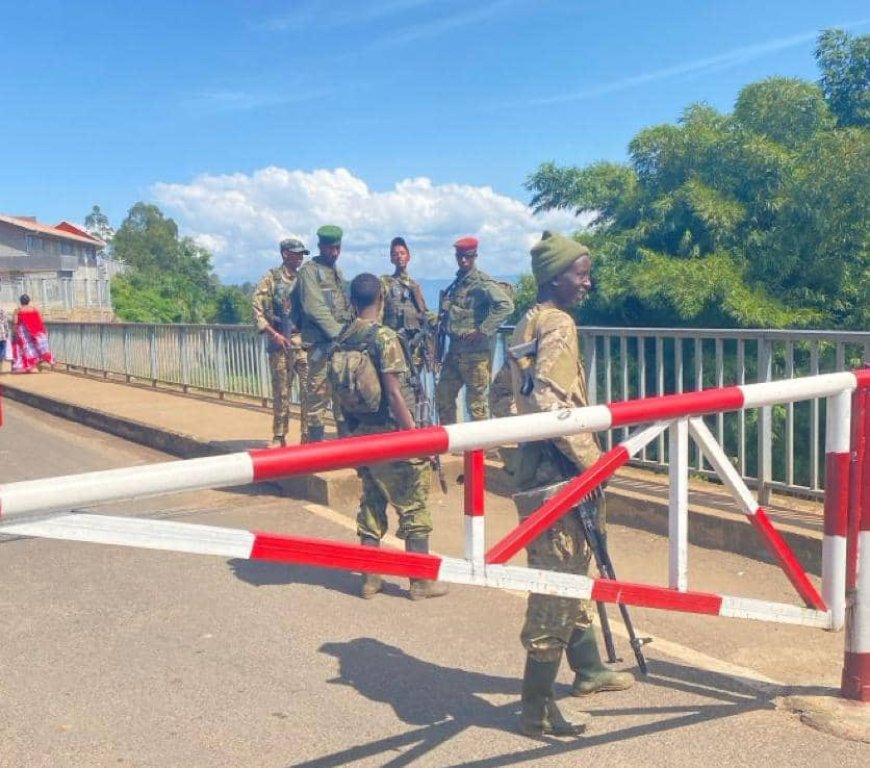M23 Rebel Group Seizes Bukavu and Rusizi I Border Post in Eastern DRC
The M23 rebel group has taken control of Bukavu and the Rusizi I border post in the Democratic Republic of the Congo (DRC), escalating tensions in the region.

The M23 rebel group has taken over the Rusizi I border crossing and moved into Bukavu, the capital of South Kivu province, marking a dramatic uptick in the continuing fighting in the Democratic Republic of the Congo (DRC). This development raises questions over the stability of the eastern Democratic Republic of the Congo and represents a significant change in the security dynamics of the region.
Capture of Bukavu:
Early on Sunday, February 16, 2025, M23 rebels broke into Bukavu, forcing border security personnel to evacuate.
M23's military spokesperson, Lt. Col. Willy Ngoma, declared the group's arrival in the city at 8:00 AM, saying, "The people of Bukavu are now breathing the air of liberation, the air of freedom." We are the army of the people.
M23 fighters were observed guarding important checkpoints in Bukavu, such as La Botte, the location of the South Kivu Governor's office, and Place de L'Independance.
Capture of Kavumu Airport
By 10:00 AM, M23 forces had secured the Rusizi I border post, located on the Rusizi River bridge that connects the DRC and Rwanda.
The capture of this strategic crossing follows M23’s seizure of Goma on January 27, 2025, which gave the group control of all major border crossings between the DRC and Rwanda.
M23’s advance into Bukavu was preceded by the capture of Kavumu Airport on Friday, February 14, 2025, located approximately 25 kilometers from the city.
The rebel group claims the airport had been used by DRC coalition forces to launch attacks on their positions.
Despite the rapid advance of M23, the office of the President of the DRC initially issued a statement asserting that the national army and local militias remained in control of Bukavu. However, multiple sightings of M23 fighters in key areas of the city, including Kadutu, suggest that government forces have retreated.
Impact on Cross-Border Activities.
Cross-border activities have continued under M23 control, with reports indicating an increase in operating hours for travelers.
A surge in movement has been observed at major border crossings, including La Corniche and a smaller crossing near Goma, since the rebel group took over these routes.
Background on M23
The M23 rebel group, primarily composed of Congolese Tutsi fighters, has been active in eastern DRC for over a decade. The group claims to fight for the rights of marginalized communities and against government corruption. However, their actions have been widely criticized for exacerbating instability and humanitarian crises in the region.
M23’s recent advances have raised concerns about the potential for further escalation, particularly given the group’s alleged ties to neighboring Rwanda, which has been accused of supporting the rebels—a claim Rwanda denies.
Humanitarian Concerns.
The ongoing conflict has displaced thousands of civilians, with many fleeing to neighboring countries or seeking refuge in safer parts of the DRC. Humanitarian organizations have warned of a worsening crisis, with limited access to essential services and supplies in conflict-affected areas.
International Response
The international community has called for an immediate de-escalation of the conflict. The United Nations and regional bodies such as the African Union have urged all parties to engage in dialogue to achieve a peaceful resolution. However, the situation remains volatile, with no clear path to stability in sight.
What’s Next?
The capture of Bukavu and Rusizi I border post represents a significant strategic victory for M23, further consolidating their control over eastern DRC. The DRC government faces mounting pressure to respond effectively, while regional and international actors must work together to address the root causes of the conflict and prevent further escalation.
 Kinyarwanda
Kinyarwanda
 English
English









































































